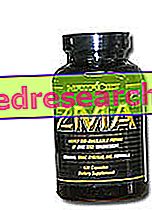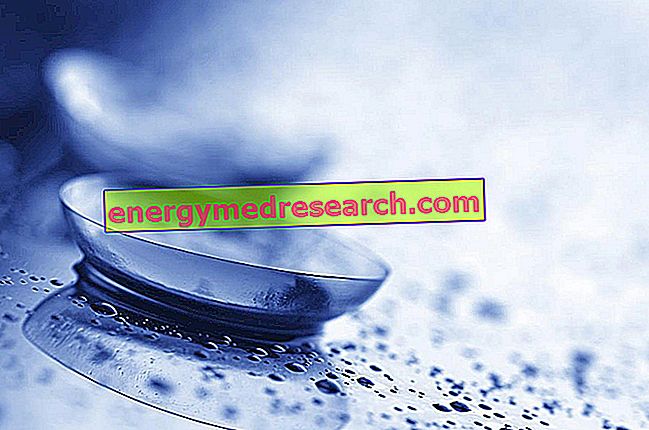
About ZMA - Natroid
ZMA -Natroid
Food supplement based on zinc, magnesium and vitamin B6
FORMAT
Pack of 120 capsules
COMPOSITION
Zinc monomethionine
Zinc / Magnesium aspartate
Vitamin B6 - pyridoxine HCl
Capsule: Hard gelatinPer capsule: Magnesium 150 mg; Zinc 10 mg; Vitamin B6 3.5 mg
Product features ZMA - Natroid
ZMA - born as an integrator able to increase the synthesis and secretion of anabolic hormones, supporting the body in the phase of muscle growth. The patented product formulation foresees the presence of the most bioavailable forms of zinc and magnesium, those that in other words are found in the common diet, associated covalently with vitamin B6.
Zinc: trace element contained in various foods, from those of animal origin to legumes and cereals. The most bioavailable forms are those present in products of animal origin, where zinc is associated with methionine, while in plant products and in particular in legumes, it is complexed with phytic acid, which significantly reduces its absorption.
Present in various tissues, and concentrated mainly in bones, skin, liver, muscles and hair, zinc is part of numerous biological reactions:
- to body growth,
- tissue repair,
- hormone synthesis,
- to the immune response,
- to the antioxidant and protective function
- metabolism in general.
Despite being involved as a cofactor in numerous biological reactions, a surplus of zinc is not able to enhance the functionality of the organism, since processes come into play to keep it at optimal concentrations, which take the form of a reduction in absorption. intestinal, and an increase in renal excretion. However deficiency of this element, albeit rare, can affect some risk categories, resulting in a delay in sexual maturation, skin rashes, chronic and profuse diarrhea, fatigue, loss of appetite, deficiency of the immune system and general malaise. Its supplementation has proved useful in reducing the incidence of infectious episodes in malnourished children, in some cases of neuropathies, in immunodeficiency syndromes, and in diabetic pathology, where it has reduced some markers of oxidative damage.
Zinc and Sport: like many other trace elements, urinary zinc secretion tends to increase following physical exercise, especially when intense. In fact, competitive athletes are one of those potentially at risk categories, where zinc supplementation could be useful. In fact, some studies have shown that an integration of 3mg / kg / day can improve the post-workout hormonal profile, both in trained and sedentary individuals, while other experimental evidence (in rats), also highlighted the possibility of reducing concentrations of lactate and increase testosterone levels both free and total.
Magnesium: ubiquitous trace element, 60% concentrated at bone level, about 27% at muscular level and for the remaining part inside the cells. Magnesium plays a fundamental role in more than 300 cellular reactions. Some of these are necessary for the survival of the organism and include glycolysis, protein and glucose metabolism, the synthesis of ATP, the stabilization of cell membranes, the control of hormonal functionality, the regulation of contractile capacities. Its requirement, estimated around at 350 / 400mg per day, it can be satisfied by simply feeding, as long as it also includes food of animal origin. Its deficiencies, although very rare, can be realized in risk categories, characterized by gastrointestinal and renal disorders, alcoholism, and in the most advanced age groups; these deficits are responsible for muscle tremors, fatigue, loss of appetite, gastrointestinal disorders, hypocalcaemia, bone thinning and widespread malaise. Supplementation of msgnesio is finding confirmation, even if with conflicting data, in the prevention of cardiovascular pathologies, osteoporosis, diabetes mellitus, migraine and asthma.
Magnesium and Sport: magnesium also appears to be involved in sports nutrition. The first evidence suggests that an intense physical activity can increase the need for this oligole of 20%, and how its uncompensated deficiencies are accompanied by a reduction in muscular contractile efficiency and an increase in the sensation of fatigue, with a consequent worsening of the athletic performance. Supplementation up to 10 / mg / kg per day has instead been shown to be effective in reducing post-workout cortisol levels, improving glucose metabolism, reducing lactate concentrations and increasing testosterone levels.
Vitamin B6: a group of water-soluble vitamins that includes pyridoxal, pyridoxine and pyridosamine. Generally introduced through supplements, in the form of pyridoxine hydrochloride, it is conveyed in the plasma with albumin, and transported to the liver where it is phosphorylated in the biologically active form, known as pyridoxal phosphate. From the liver it can be effectively sorted to the various tissues by returning to:
- Glucose metabolism: gluconeogenesis and glycogenolysis;
- Neurotransmitter synthesis: is part of the synthesis of serotonin;
- Maintenance of erythrocyte function: coenzyme is included in the EME group synthesis;
- Control of hormonal activity;
- Synthesis of nucleic acids.
LARNs suggest the daily intake of 1.1 mg of vitamin B6 for women and 1.5 mg for men, which can be easily satisfied with a balanced diet containing products of animal origin.
Rationale for use - ZMA - Natroid

However, more recent studies, better characterized and with a decidedly more significant sample, did not confirm the positive results obtained by Brilla et al., Recording only a statistically significant increase in zinc levels (12/17%), while absent was the contribution to the hormonal aspect.
Subsequent studies have also shown how, despite the increase in urinary excretion of these elements following physical activity, the athlete's diet is able to satisfy the body's demands to the full, preserving the body from possible deficiencies.
Recommended use by the company - ZMA - Natroid
Take one ZMA capsule (400mg) in the evening on an empty stomach before bed.
Use in sports - ZMA - Natroid
To reproduce the dosages used by Brilla et all., In the only study documenting anabolic and ergogenic effects after taking ZMA, you should take 3 capsules a day preferably on an empty stomach.
Side effects ZMA - Natroid
Zinc: high amounts of zinc introduced are responsible for abdominal pain, diarrhea, nausea and vomiting. Chronic zinc administration (60 mg / day total) is associated with copper deficiency.
Magnesium: high amounts of magnesium are responsible for profuse diarrhea. The increase in serum magnesium levels is instead associated with hypotension, confusion, heart rhythm disorders, deterioration of renal function, fatigue, difficulty in breathing, and even cardiac arrest. The dose of safe supplementation appears to be 350 mg / day.
Vitamin B6: chronic administration can be responsible for damage to the nervous system and neuropathies of various levels already at doses higher than 200mg / day.
ZMA interactions - Natroid
Zinc: in addition to interfering with other trace elements such as copper, it could reduce the absorption of some antibiotics such as tetracyclines, reducing their effectiveness.
Magnesium: may interfere with some antibiotics, tranquilizers and oral anticoagulants, reducing their effectiveness.
Precautions for using ZMA - Natroid
The product is contraindicated in cases of renal or hepatic disease, cardiovascular disease and / or hypertension, during pregnancy, during lactation and under 14 years.
This article, elaborated on the critical re-reading of scientific articles, university texts and common practice, is for informational purposes only and is therefore not a medical prescription. It is therefore always necessary to consult your doctor, nutritionist or pharmacist before starting to use any kind of supplement . More information on the critical analysis of ZMA - Natroid.
| BIBLIOGRAPHY |
Serum testosterone and urinary excretion of steroid hormone metabolites after administration of a high-dose zinc supplement. Koehler K, Parr MK, Geyer H, Mester J, Schänzer W. Eur J Clin Nutr. 2009 Jan; 63 (1): 65-70. Epub 2007 Sep 19. Effects of Zinc Magnesium Aspartate (ZMA) Supplementation on Training Adaptations and Markers of Anabolism and Catabolism. Wilborn CD, Kerksick CM, Campbell BI, Taylor LW, Marcello BM, Rasmussen CJ, Greenwood MC, Almada A, Kreider RB. J Int Soc Sports Nutr. 2004 Dec 31; 1 (2): 12-20 Effect of fatiguing bicycle on thyroid hormone and testosterone levels in sedentary males supplemented with oral zinc. Kilic M. Neuro Endocrinol Lett. 2007 Oct; 28 (5): 681-5. The effect of exhaustion on thyroid hormones and testosterone levels of elite athletes receiving oral zinc. Kilic M, Baltaci AK, Gunay M, Gökbel H, Okudan N, Cicioglu I. Neuro Endocrinol Lett. 2006 Feb-Apr; 27 (1-2): 247-52. Zinc supplementation in rats subjected to acute swimming exercise: Its effect on testosterone levels and relation with lactate. Kaya O, Gokdemir K, Kilic M, Baltaci AK. Neuro Endocrinol Lett. 2006 Feb-Apr; 27 (1-2): 267-70. Neuroendocrine responses to running in women after zinc and vitamin E supplementation. Singh A, Papanicolaou DA, Lawrence LL, Howell EA, Chrousos GP, Deuster PA. Vitamin and mineral status of trained athletes including the effects of supplementation. Weight LM, Noakes TD, Labadarios D, Graves J, Jacobs P, Berman PA. Am J Clin Nutr. 1988 Feb; 47 (2): 186-91. Effects of Magnesium Supplementation on Testosterone Levels of Athletes and Sedentary Subjects at Rest and after Exhaustion. Cinar V, Polat Y, Baltaci AK, Mogulkoc R. Biol Trace Elem Res. 2010 Mar 30. [Epub ahead of print] .The effects of magnesium supplementation on thyroid hormones of sedentars and Tae-Kwon-Do sportsperson at resting and exhaustion. Cinar V. Neuro Endocrinol Lett. 2007 Oct; 28 (5): 708-12. Update on the relationship between magnesium and exercise. Nielsen FH, Lukaski HC. Magnes Res. 2006 Sep; 19 (3): 180-9. Review. Magnesium sulfate enhances exercise performance and manipulates dynamic changes in peripheral glucose utilization. Cheng SM, Yang LL, Chen SH, Hsu MH, Chen IJ, Cheng FC. Eur J Appl Physiol. 2010 Jan; 108 (2): 363-9. Epub 2009 Oct 9. Magnesium sulfate enhances exercise performance and manipulates dynamic changes in peripheral glucose utilization. Cheng SM, Yang LL, Chen SH, Hsu MH, Chen IJ, Cheng FC. Eur J Appl Physiol. 2010 Jan; 108 (2): 363-9. Epub 2009 Oct 9. The effect of magnesium supplementation on the levels of sportsmen and sedanter. Cinar V, Nizamlioğlu M, Moğulkoc R. Acta Physiol Hung. 2006 Jun; 93 (2-3): 137-44. |



